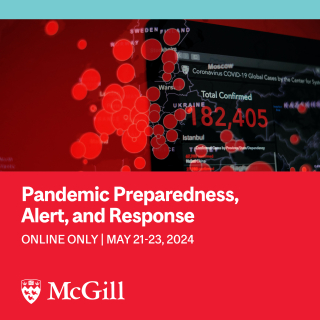
View courses by theme or by week

Online only. Course will be live approximately 9:00am-1:00pm (Montreal time) each day May 21-23, 2024. Live content will be recorded and available until July 1, 2024.
This course will offer a deep dive into the multifaceted world of pandemics, emphasizing their origins, biology, and the intricate dynamics of their emergence and spread. It provides a holistic overview of global systems designed for pandemic prevention, preparedness, and management, while also spotlighting the imminent policy dialogues at the World Health Assembly, aimed at revising the International Health Regulations (IHR) and formulating a groundbreaking legal framework on pandemics. Participants will gain insight into epidemiology, public health and global health, delve into critical policies being currently negotiated and participate in joint learning of future opportunities and threats for global health while learning from experts and leaders in the respected fields.\
Yassen Tcholakov, MD MSc MIH
Assistant Professor, Department of Epidemiology, Biostatistics, and Occupational Health, McGill University
Clinical Lead in Infectious Diseases, Nunavik Department of Public Health
Chen Liang, PhD
Professor, Department of Medicine, McGill University
Director, McGill Centre for Viral Diseases
Pandemics, as starkly demonstrated by the COVID-19 pandemic, have the profound ability to reshape societies and deeply affect human health. This year's course aims to enhance understanding of pandemics by delving into their origins and dissecting multidisciplinary approaches for their prevention and management, encompassing fields like biology, epidemiology, public health, and clinical medicine. Key discussions will revolve around global systems, scrutinizing how they can either advance or impede global equity, especially concerning access to essential countermeasures. Further, we will probe into the intricate link between human and animal health and discuss the One Health approach and the paramount importance of epidemic intelligence including diverse sources of surveillance data including animal disease surveillance. Participants will engage in a foresight exercise using collective intelligence to explore possible futures to identify trends, key factors, and emerging issues related to pandemics. Concluding the course, participants will be privy to in-depth discussions and dialogue with key policymakers who are at the center of health negotiations that will happen the subsequent week in Geneva at the World Health Assembly, where the anticipated adoption of the Pandemic Treaty and amendments to the International Health Regulations (IHR) will set the stage for future pandemic preparedness and response.
By the end of the course, participants will be able to:
Limited to 100 online participants.